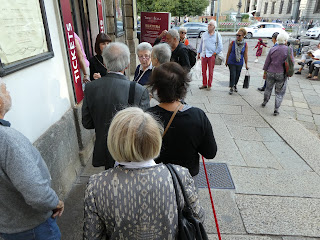I'm back to blogging again after more frustration with fiction.
Milan, last year:
Getting tickets to La Scala was a more interesting experience than the actual opera, Alibaba and the forty Thieves, itself. We guessed, in a fightback against scalpers, the Italian government had installed checks and re-checks on buying tickets at the box office. We had to get on one list with our names and passport numbers. After a long wait, we were escorted to a machine where we were supposed to relist everything which would then allow us to get on the real ticket list. By tuning into other conversations and watching people, we realized we didn't have to check-in at the machine. Somehow we ended up in a group allowed to buy the really cheap tickets, eleven euros each. Italians seem to enjoy everything—even the lines and confusion had a good-natured vibe.
 |
| Boring photo of the ticket space |
 |
| Looks calm but confusion reigned in six or seven languages |
The tickets were terrible but even the best seats at La Scala for 250 euros aren't very good. We were in the nose-bleed section and could barely see the top of the curtains running across the stage. By standing up we got an occasional glimpse. The opera was awful...overture not bad, but everything else, mediocre. Our seatmate (we were almost in each other's laps) was a nineteen-year-old Italian kid, thrilled to be sitting next to two Californians. He'd spent a summer vacation in a house trade with people from San Clemente. At intermission, we said, "Ciao" to the kid and snuck out.
Here's a review by Renata Verga on the Bachtrack website:
https://bachtrack.com/review-cherubini-ali-baba-academy-scala-milan-september-2018
Here's a review by Renata Verga on the Bachtrack website:
https://bachtrack.com/review-cherubini-ali-baba-academy-scala-milan-september-2018
At the head of the instrumentalists, conductor Paolo Carignani managed to get the sounds and the right tempi of a score that, after the brilliant overture, is often limited to supporting the singers in their melodic lines without turning into a tune to remember. Yes, the wisdom of Cherubini's writing is admirable, but one remains indifferent to the plot and to the two-dimensional characters on stage. Ali Baba is not a grand-opéra, but has its own dances, here wittily cavorted by young, some very young, ballet students in Emanuela Tagliavia's choreography.
Liliana Cavani, who took care of the staging, has clearly expressed her intent to relate the story in a very linear fashion, without opting either for the comic nor for the fairy-tale tone. The result was a visual rendition without a backbone which, even if it nods to contemporary taste – the library in which the four main characters as students read the folk tale and have their first love skirmishes; the getaway in motor-scooter in the finale – fall back on outdated staging and scenery. It does not put to use some twists of the plot, such as the procession of slaves with the treasures stolen by Nadir, which could have given a more theatrical touch to the staging. Meanwhile, the director trivializes other moments: why the need to show Delia having a footbath during her only true great aria? Also, one could have willingly done without the sight of the burnt corpses of the thieves during the cheerful and hurried conclusion.
xxxxxxx
Afterward, we stopped into the new Starbucks cathedral (no line at 9:45, just before closing), had a pizza and bought croissants for breakfast.
Mixed feelings from the Italians we talked to about Starbucks. They love their own coffee but most agree what Starbucks did to an abandoned post office building in mid-Milan is fantastic. And the Starbucks itself is a marvel, although still shaking out the opening problems.
I noticed the next day, which we spent at the Cathedral, that the garden at the front of the Cathedral square was donated by and being maintained by Starbucks. They are good neighbors.
Mixed feelings from the Italians we talked to about Starbucks. They love their own coffee but most agree what Starbucks did to an abandoned post office building in mid-Milan is fantastic. And the Starbucks itself is a marvel, although still shaking out the opening problems.
I noticed the next day, which we spent at the Cathedral, that the garden at the front of the Cathedral square was donated by and being maintained by Starbucks. They are good neighbors.

No comments:
Post a Comment